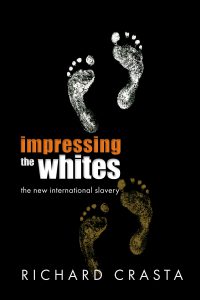Growing up in an innocent and sheltered pocket of Southwestern India, bordered on the west by the Arabian Sea, on the east by the Western Ghats mountains, and on its southern side by a state with speakers of Malayalam, a language totally incomprehensible to me, I did not really know the difference between black and white.
Meaning, I had no conception of race, or of race as associated with skin color, or that it had any meaning at all. The Jesus and Mary that I worshipped in Church, and prayed to at home: they had white skin, brown hair, and blue eyes. God the Father was a white man with a beard. And wasn’t he our father? Then how could I be different from any other of God’s children, since he was the father of all of us, the Holy Father included?
Did it even occur to me to ask why Jesus or his Pop were white? No, it simply didn’t, and not just because you don’t question someone as imposing as God the Father, one whose nickname is The Almighty One. And though my Hindu neighbors worshipped gods who, many of them, had blue skin, and a few (the pre-Aryan gods) with coal-black skin, I never ever came upon a black or brown-skinned Jesus, or even a statue of a brown or black saint. In these circumstances, a black Jesus would have been incomprehensible and even heretical: not the least because the devil, as it turned out, was black as night, black as . . . the bloody devil.
But it was all right. Everything was all right. It never occurred to me to ask why brown people ought to worship a white god, or any other color of god: this was just the color they were, just as roses were red (except when they were not), and violets were blue, and it never occurred to me to question why. After all, I had not met a single living human being from Galilee, and had no information to disprove that men from Galilee had brown hair and blue eyes.
Besides, added the old, bearded, faint-voiced, and relatively fairskinned (but brown) Jesuit priest who taught us Holy Catechism – the Jesuit Rector had designated him to teach us that, because he was too old to teach anything else, and he alternated between an official Catechism book and pious stories from a fornication-and-incest-censored Bible. According to him, there was only one sin that was eternally unforgivable, now and forever: a sin against the Holy Ghost (yes, it was never the Holy Spirit then, but always the Holy Ghost, who scared us as ghosts are properly expected to).
What nefarious sin was that, precisely? One couldn’t be sure, and I asked, but never received a clear answer from him. And for that very reason, it did cause me a few sleepless nights (what if I had committed that sin without knowing it? Even then, I knew that ignorance of the law was not an excuse). But I would have been willing to bet that “doubting that God the Father and his Son had a white skin” was pretty much as close to an unforgiveable sin as there could be.
[Note: Excerpt of a book in progress. The completion of this book requires time and funding (or lots of royalties from book sales!). However, excerpts will hopefully be published soon on Amazon, Apple, Google Play etc.]











